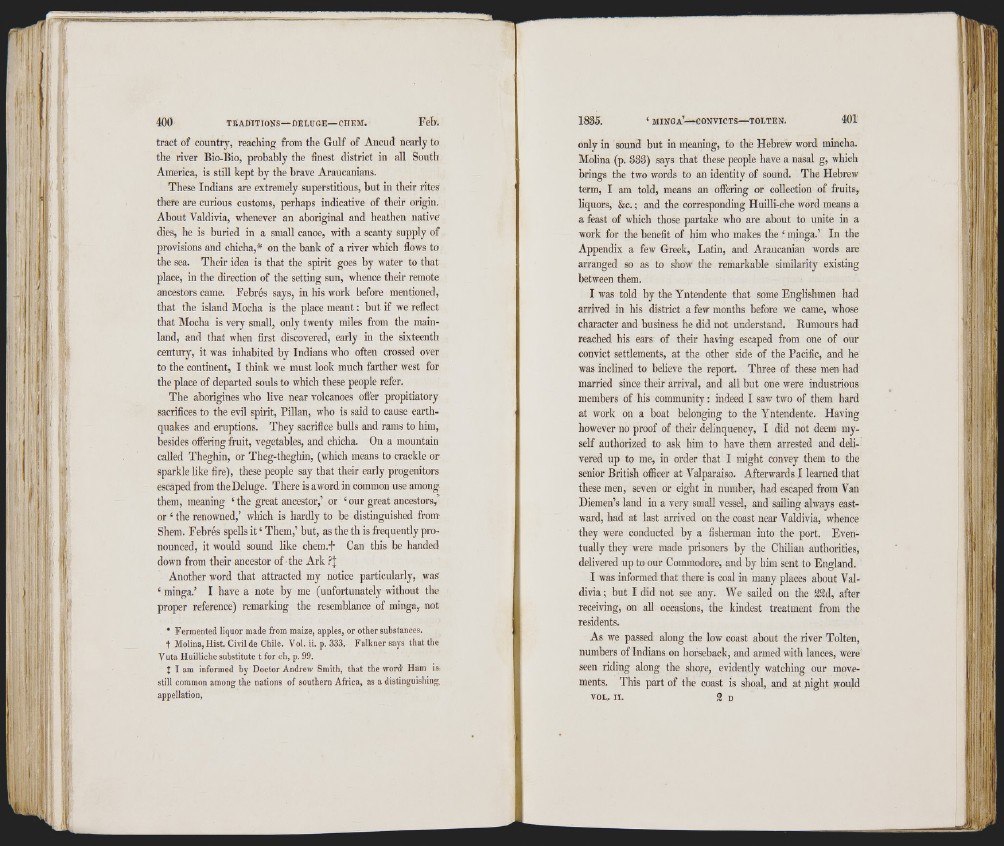
400 TRADITIONS— DELUGE CHEM. Feb.
tract of country, reaching from the Gulf of Ancud nearly to
the river Bio-Bio, probably the finest district in all South
America, is still kept by the brave Araucanians.
These Indians are extremely superstitious, but in their rites
there are curious customs, perhaps indicative of their origin.
About Valdivia, whenever an aboriginal and heathen native
dies, he is buried in a small canoe, with a scanty supply of
provisions and chicha,* on the bank of a river which flows to
the sea. Their idea is that the spirit goes by water to that
place, in the direction of the setting sun, whence their remote
ancestors came. Febres says, in his work before mentioned,
that the island Mocha is the place meant: but if we reflect
that Mocha is very small, only twenty miles from the mainland,
and that when first discovered, early in the sixteenth
centm-y, it was inhabited by Indians who often crossed over
to the continent, I think we must look much farther west for
the place of departed souls to which these people refer.
The aborigines who live near volcanoes offer propitiatory
sacrifices to the evil spirit, Pillan, who is said to cause earthquakes
and eruptions. They sacrifice bulls and rams to him,
besides offering fruit, vegetables, and chicha. On a mountain
called Theghin, or Theg-theghin, (which means to crackle or
sparkle like fire), these people say that their early progenitors
escaped from the Deluge. There is aword in common use among
them, meaning ‘ the great ancestor,’ or ‘ our great ancestors,
or ‘ the renowned,’ which is hardly to be distinguished from'
Shem. Pebres spells it ‘ Them,’ but, as the th is frequently pronounced,
it would sound like chem.-f Can this be handed
down from their ancestor of the Ark .?]
Another word that attracted my notice particularly, was
‘ minga.’ I have a note by me (unfortunately without the
proper reference) remarking the resemblance of minga, not
* Fermented liquor made from maize, apples, or other substances,
t Molina, Hist. Civil de Chile. Vol. ii. p. 333. Falkner says that the
Vuta Huilliche substitute t for ch, p. 99.
J I am informed by Doctor Andrew Smith, that the word' Ham is
still common among the nations of southern Africa, as a distinguishing
appellation,
1835. ‘ m in g a ’ CONVICTS— TOLTEN. 401
only in sound but in meaning, to the Hebrew word mincha.
Molina (p. 333) says that these people have a nasal g, which
brings the two words to an identity of sound. The Hebrew
term, I am told, means an offering or collection of fruits,
liquors, &c.; and the corresponding Huilli-che word means a
a feast of which those partake who are about to unite in a
work for the benefit of him who makes the ‘ minga.’ In the
Appendix a few Greek, Latin, and Araucanian words are
arranged so as to show the remarkable similarity existing
between them.
I was told hy the Yntendente that some Englishmen had
arrived in his district a few months before we came, whose
character and business he did not understand. Bumours had
reached his ears of their having escaped from one of our
convict settlements, at the other side of the Pacific, and he
was inclined to believe the report. Three of these men had
married since their arrival, and all but one were industrious
members of his community : indeed I saw two of them hard
at work on a boat belonging to the Yntendente. Having
however no proof of their delinquency, I did not deem myself
authorized to ask him to have them arrested and delivered
up to me, in order that I might convey them to the
senior British officer at A'alparaiso. Afterwards I learned that
these men, seven or eight in number, had escaped from Van
Diemen’s land in a very smaU vessel, and sailing always eastward,
had at last arrived on the coast near Valdivia, whence
they were conducted by a fisherman into the port. Eventually
they were made prisoners by the Chilian authorities,
delivered up to our Commodore, and by him sent to England.
I was informed that there is coal in many places about Valdivia
; but I did not see any. We sailed on the 22d, after
receiving, on all occasions, the kindest treatment from the
residents.
As we passed along the low coast about the river Tolten,
numbers of Indians on horseback, and armed with lances, were
seen riding along the shore, evidently watching our movements.
This part of the coast is shoal, and at night would
VOL. II. 2 D